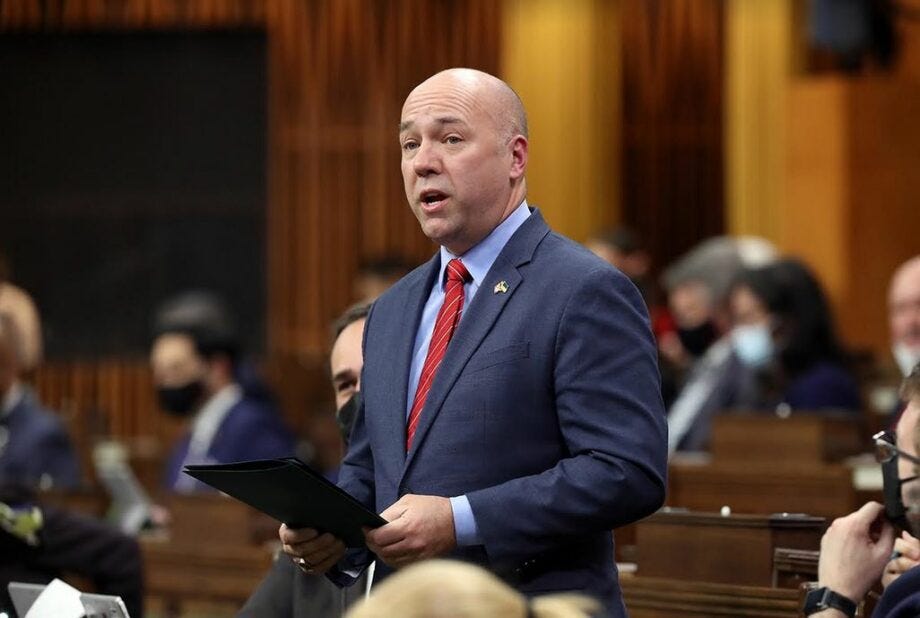Andy Fillmore was elected mayor of Halifax last October. He is the second consecutive mayor of that city who retired as a member of parliament from the Liberal Party of Canada to become a civic leader—Haligonians like to recycle.
Before entering federal politics, Fillmore served as a city planner in Halifax, engaged in various community development projects. His urban planning and architecture background has informed his approach to public service, focusing on sustainable development and community engagement.
In 2015, Andy Fillmore was elected as the Member of Parliament for Halifax as part of the Liberal Party of Canada wave under the leadership of Justin Trudeau. During his tenure as an MP, Fillmore's work branched out to social justice issues, perhaps hoping to increase his intersectional chances of advancement. His expertise and experience in reforming penal codes, however, is nil.
Fillmore became a vocal advocate for addressing systemic issues within Canada's criminal justice system, including efforts to combat systemic racism. Trudeau's Liberals see race problems everywhere, except among themselves or in sporting Blackface to mock people.
In his remarks on the Floor of the House of Commons on June 9, 2022, Fillmore stated: "Our government is committed to eliminating the systemic racism inherent in Canada’s criminal justice system... Bill C-5 represents an essential step in correcting these historical injustices and ensuring that justice is served equitably."
The new mayor seems compassionate but has never been accused of being that thoughtful. His speeches are peppered with woke pablum and platitudes designed to seem virtuous and caring, righting historical wrongs and promoting equity that can never be delivered. If racism is inherent in the penal system, as Fillmore claims, in its DNA as it were, then no amount of reform could get rid of it. One would have to abolish it, which is impossible. Yet, he convinces his constituents that it can yield good fruit.
His support for Bill C-5, which aimed to amend the Criminal Code and the Controlled Drugs and Substances Act, is supposed to demonstrate a commitment to these causes. However, his stance on such legislation shows that he never considered the harmful results (and if he did, he was silent on them).
For starters, the crime rate in Halifax has increased since he was elected MP with the Trudeau wave, as it has across Nova Scotia and the rest of the country. Letting violent people out more easily on the claim that it addresses "inherent" injustice does not account for the injustices that the changes will generate. What is more, the caucus to which he belonged claimed to have formed a feminist government, yet the crime rates against women also increased.
The recidivism rate for sexual offenders in Canada is approximately 14% over 15 years. Indigenous women are three times more likely to experience sexual assault compared to non-Indigenous women in Canada. The rate of sexual assault increased by 18% from 2019 to 2021, before the COVID policies, including those of the federal government, and increased domestic violence and many other crimes. These numbers do not take into account that 70% of sexual assaults in Canada are not reported to the police.
Halifax has experienced fluctuations in crime rates since 2015. According to Statistics Canada, the Crime Severity Index (CSI) measures the volume and severity of police-reported crime. In 2015, Halifax had a CSI of 70.6, which was below the national average. However, by 2020, the CSI had risen to 80.5, indicating increased crime severity.
Violent crime in Halifax has been a particular concern. Between 2015 and 2020, the city saw a rise in incidents such as assault, robbery, and sexual offences. For instance, the rate of sexual assault cases reported to police increased during this period, reflecting broader national trends. This rise in violent crime has contributed to public anxiety about safety, particularly among vulnerable groups such as women and minorities.
Property crime, including breaking and entering, theft, and vandalism, has also been a persistent issue in Halifax. While there have been efforts to address these crimes through community policing and other initiatives, the rates have not significantly declined. The increase in property crime has been linked to various socio-economic factors, including poverty and substance abuse, which continue to challenge law enforcement and community support systems.
Haligonians should remember Fillmore's recent decisions, particularly his support for Bill C-5, considering the impact on the community. Fillmore voted in favor of Bill C-5, titled "An Act to amend the Criminal Code and the Controlled Drugs and Substances Act," repealing specific mandatory minimum penalties, promoting the use of conditional sentences, and encouraging alternatives to incarceration. The informing motivation was that mandatory sentences tend to affect racial minorities more because racial minorities often commit a more significant proportion of crimes. The reason is economic and not necessarily racial. Increases in the economic opportunities of people tend to reduce crime, while subsidies and handouts, Fillmore's preferred methods, achieve the opposite.
While the intention behind the Trudeau reform bill was to address supposed systemic issues, its implications show a contrasting impact. The legislation supposedly meant to build a fair justice system thoughtlessly jeopardizes public safety and detrimentally affects the most vulnerable populations, including children, women and minority groups.
The case of Samuel Clements Green underscores these anxieties. Released after serving just over nine years for a series of egregious offences, his freedom is a startling demonstration of the perceived leniency that reforms like Bill C-5 might introduce. Many fear that without stringent oversight, such measures lead to an increase in crimes and a sense of insecurity, particularly within Indigenous communities that Bill C-5 purportedly aims to protect.
For someone at the helm of Halifax, Fillmore’s support for such policies reflects a complex challenge, to put it mildly. As a leader, his progressive role in supporting reforms has led to changes that compromise community safety. Fillmore’s stance, the woke virtue-signalling approach, poses a significant question: in pursuing justice reform, he overlooked the immediate safety needs of the city he now leads and serves.





